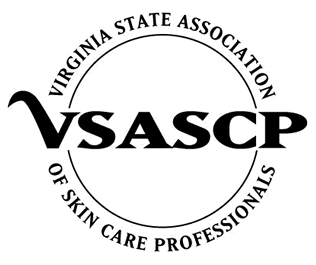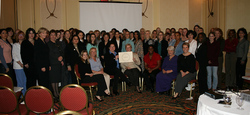About UsThe Virginia State Association for Skin Care Professionals - (previously known as The Virginia Panel for Esthetics Licensure)
The Virginia Panel was founded by estheticians; school owners and interested parties who sought to establish licensure for Virginia’s estheticians. The co chairs of the Virginia Panel for Esthetics Licensure were Melanie Trainer and Laura Todd. Both Todd and Trainer along with the other panel members worked endlessly to ensure licensure and the regulations for Virginia became what they are today. As a result, Virginia is now one of the highest qualifying licensure in the Nation! In 2005 The Virginia Panel drafted a bill. The Bill was viewed by other schools, interested parties and associations and was officially introduced as HB2510 by Delegate Welsh. The Virginia Panel along with estheticians, other parties & associations introduced HB2510 in the 2005 general assembly. HB2510 was widely supported by other school owners & estheticians that were interested in raising the bar in Virginia. The Panel met with the Medical Society of Virginia, the Massage therapy lobbyists and other interested parties to ensure all supported the bill and goal of esthetics licensure in Virginia. Many changes were made to the bill. Ms. Todd personally met with Becky Bowers Lanier, the Massage therapy lobbyist, to change the word Massage to “effleurage and related movements” to ensure certain language was reserved for massage therapists and “Panel Member Christine Gordon was instrumental in the process and worked closely with the Medical Society to address issues of concern.” The Virginia Panel did not hire a lobbyist but took a “grass roots approach” and personally went door to door to all of the offices of the Delegates and Senators in 2005 as well as personally pledging monies to purchase pins worn (Support HB2510 2-Tier = Safety) by all HB2510 supporters as well as organizing and financing a “Day Spa at the General Assembly” to promote awareness for our cause. Universal companies donated many items to the Virginia Panel for the Day Spa event as well as Graham Web Academy, the Institute of Advanced Medical Esthetics and Andre’s Spa in Richmond Virginia. At the end of the day the buzz around the General Assembly was that the reason the bill passed was “the passion of the industry professionals, the person approach versus hiring a lobbyist who knew nothing about skincare to plead a case that was not their own personal interest and mission.” The unity demonstrated during this effort was the “planted seed” for the Virginia State Association of Skin Care Professional that has now grown into a statewide organization, thousands strong! |
VASACP BOARD MEMBERS |
Laura Todd – Executive Director, Institute of Advanced Medical Esthetics Matthew England – Legislative Liason, Institute of Advanced Medical Esthetics other appointments .... coming soon |

Heather Kvaternik

Tekeyla Perdue

Martha Riggs Sznoluch
PANEL CO-CHAIR TO STATE BOARD APPOINTMENT |
The Virginia Panel for Esthetics Licensure Co Chair appointed to the Board
to represent Virginia’s Estheticians As a result of Ms. Todd’s “no stone unturned approach”, her tenure as school President at The Institute of Advanced Medical Esthetics, in Richmond Virginia, and her University training in Education, she was appointed by Governor Warner to serve on the Virginia Board of Cosmetology. Ms. Todd held the first full term seat on the board and was responsible for drafting the esthetics regulations with the help of the office administration. Her university degrees in Science, Biology and Masters of Education coursework were invaluable to the completion of this task. The regulations include school curriculum, sanitation guidelines, and equipment standards for Virginia Esthetics schools. Ms. Todd (along with other Panel Members) founded and now serves as the Executive Director of Virginia Sate Association of Skin Care Professionals. She also served as a subject matter expert for the NIC examination committee and assisted in developing the Master Esthetics Examination, which will be used in Virginia and nation wide. Ms. Todd is also featured in many industry trade magazines as a subject matter expert, and was commended by a feature article in Skin Inc’s March 2007 “face to face” spotlighting her contributions to Virginia’s Esthetics Licensure. She is also a leading author for Milady publishing and her book Advanced Face and Body Treatments for the Spa was released on July of 2007, also contributing to Advanced Esthetics, which is due out in 2008. |
The History of Virginia's Esthetician Bill?
|
The History of Virginia's Esthetician Bill?
authored by Melanie Trainer On Saturday, February 26, 2005, the Virginia legislature passed a bill that would regulate esthetics and create a two-tiered system of licensure. This new licensure was envisioned as having a basic Esthetics license with 600 hours of training, and a Master's license, with 1200 hours of training. What was unusual about this bill is what little opposition it truly had considering that prior to this new legislation, Virginia was the last State in the nation to regulate esthetics, never mind creating dual licensure. The history of this Virginia legislation can be traced back to the 2002 legislative session when a bill was proposed to study this issue. The State Board that oversees professional licensure in Virginia, the Board for Professional Occupational Regulation (DPOR), was tasked with writing a study for the Virginia legislature on the need to regulate esthetics, and if they concluded that it did need regulation, how to go about doing so. In November of 2002, DPOR wrote in a lengthy study that "....the Board found convincing evidence to support regulation by mandatory licensure of Esthetics..." and "Public comment supported regulation of esthetics but indicated that several licensure categories may be needed to encompass the different services provided and the training and education required to perform these services...". With this ammunition in hand, various interest groups formed in Virginia to craft a bill based on the study's recommendations. In the fall of 2004, one of these groups, PEA (Professional Esthetics Association), which had been formed for this purpose, splintered when the vast majority of its members that supported two-tier found out that a small faction that supported no Master's license, was going to introduce a bill to this effect. Those that wanted dual-licensure formed their own groups and began working on alternative legislation. Late in 2004, SVSS worked with the newly formed Virginia Panel for Esthetics Licensure to promote two-tier legislation, co-chaired by Laura Todd of the Institute of Advanced Medical Esthetics, Richmond, VA and Melanie Trainer of Graham Webb Academy, Arlington, VA. A bill was crafted and introduced by our sponsor, Delegate John Welch, III, (R-Virginia Beach). When the 2005 legislative session began in January, Delegate Welch introduced a two-tiered bill that many felt had little chance of passing. In order to increase the chance of passage, the Virginia Panel sponsored a "spa day" for members of the General Assembly and their staff. This spa day was instrumental in educating members on the field of esthetics and promoting awareness of our cause. Universal Companies, a premier distributor and manufacturer of esthetics devices and products, donated gifts for members and staff and State media covered the event. All in all, it was a great success and gave the bill some much needed bolstering. During the initial House hearings, a small faction of discontented (name omitted) members testified against the bill, citing the lack of precedence for two-tier legislation. The Panel and SVSS were able to counter their arguments, citing the Utah two-tier legislation, and the model of esthetics licensure championed by the National Coalition of Esthetic and Professional Association. In addition, Susanne Warfield of NCEA wrote letters in support of the bill to Delegates, informing them of the issue and discrediting misrepresentations put out by our opposition. Ms. Warfield also sent out blast e-mails to Virginia estheticians and esthetic school's with correct information about the legislation. The bill was reported out favorably and quickly passed the House of Delegates by a wide margin. At this point, the bill headed to the Senate where some difficulties arose. It quickly became evident that the remnants of PEA were going to continue fighting the bill in the Senate, and presented the same information against the Master's portion of the bill at the Senate hearing. Luckily, the Panel and SVSS continued working on educating the Senators and we were able to have the bill reported out favorably of the Senate General Laws Committee, with only two dissenting votes. There were moments of heartburn when a Senate floor amendment was offered that would have had the two newly created esthetics Board seats be paid out of a non-general revenue fund. Technically, this could have delayed implementation of the bill, but the amendment was killed in a conference committee on the closing weekend of the General Assembly, thus paving the way for final passage. Many lessons were learned from the successful passage of this bill. One, Virginia was ready for licensure and the two groups that worked with the appropriate State agencies were successful in ultimately gaining those agencies' support. Second, we were lucky in that groups that could have been opposed to our bill (i.e. the Medical Society of Virginia, massage therapists, Career College Association) worked with us to clarify any of their issues, and they in turn came out in support of our bill. Third, our opposition worked so hard on killing the Master's portion of our bill, issues such as creating two new board positions never became controversial. Fourth, having more than one group supporting a bill and working with other groups showed unity and strength to members of the General Assembly. Fifth, working to educate members as to how esthetic procedures can be complicated and those performing those services (i.e. microdermabrasion and chemical peels in particular) needed to be properly trained. We had pictures of chemical peels performed by untrained personnel and some of their horrifying effects. These pictures themselves persuaded many members who are against any type of regulation to strongly support our bill. Sixth, it was important to remember that those of us working on this issue needed to present a united front and get this important legislation passed. It was unimportant who ultimately gets the credit. And lastly, it is vital that anyone looking to pass legislation find a legislator that is willing to go to bat for you and make sure that everyone stays well informed on any issues that may arise. We in Virginia were lucky that Delegate John Welch was our bill's sponsor. He and his chief of staff worked to ensure victory for Virginia and it's estheticians. As we go forward now with our new legislation, it will be important to remain united behind implementation of a successful two-tiered system. We will continue to work with our State agency's to hopefully ensure that the curriculum is correct and that the appropriate modalities go into both the first-tier Basic Esthetics license (600 hours) and the second-tier (1200 hours) or Master's Esthetics license. With many States looking to add hours to their esthetics license, we strongly recommend that they consider the dual-tier approach. |
IN THE NEWS!
|
RUB DOWN AT THE CAPITOL
Assembly gets a little face time Virginia is one of two states that does not regulate spas BY PENELOPE M. CARRINGTONTIMES-DISPATCH STAFF WRITER Feb 27, 2005 Virginia estheticians went to the General Assembly yesterday and asked for some skin. They got it, as a bustling stream of aides, secretaries and members of the House of Delegates visited an eighth-floor conference room-turned-day-spa. The setup was complete with beds for the free facials, skin analysis machines and spa-related gifts. It was designed to educate the politicians and their staffs about the esthetics field. That, and to get their support for House Bill 2510. Its passage would require estheticians those who do basic facials and more advanced skin treatments -- to be licensed. Virginia is one of two states without such regulation. Connecticut is the other, yet even that state has minimal regulations, said Christine Gordon, owner of the Graham Webb Academy in Arlington County. "So we really are dead last," she said. Gordon, a member of the board of the American Association of Cosmetology Schools and the Virginia Panel for Esthetics Licensure, said the bill would "bring Virginia up to date and send it to the forefront." At this point, anyone in Virginia can open a day spa and offer facials and advanced skin treatments without specialized training. Proponents of the bill say the lack of standards puts consumers at risk for infection, improper treatment or permanent skin damage. "When you go to someone like that, you trust they're going to be clean. You trust they know what they're doing, but there is no guarantee," said Norma Opel, secretary to Dels. Gary A. Reese, R-Fairfax, and Mark L. Cole, R-Spotsylvania. Opel stopped in for a skin analysis shortly after the "spa" opened at 11 a.m. in the General Assembly Building. The diagnosis: Sun damage. Regulating estheticians, Opel said, "gives you confidence that they're accountable to someone else and that they've had testing and studied." Virginia estheticians, educators, spa owners, equipment suppliers and political advocates say the bill is a step toward educating the public and establishing such accountability. It would also validate a rapidly evolving industry that takes in about $14 billion a year in the United States. The bill, put forth by the Virginia Society of Skin Care Specialists and supported by the Panel for Esthetics Licensure, proposes a two-tier approach that would require 600 hours of training for a license to perform basic techniques and 1,200 hours for advanced techniques. Utah, the gold standard for estheticians, is the only state with the two-tier standards. That's why estheticians across the nation will be watching Virginia closely, Gordon said. Laura Todd, owner of the area's Institute of Advanced Medical Esthetics and a member of the Panel for Esthetics Licensure, said yesterday's event opened many eyes. "We've had more support and more people interested in it and finding out about the scientific aspects. It's more than creams. It's about anatomy, physiology and applying your scientific background . . . because esthetics is scientific skin care." Todd and two of her students were among the 11 estheticians, school owners and students who provided services to more than 130 people yesterday. Del. John A. Cosgrove, R-Chesapeake, was among them. He endured a skin analysis and facial under protest. "My legislative aide made me come," he said. "He needs to relax. He's stressed," added the aide, Christie Craig, who opted out because she didn't bring makeup to reapply. It was a familiar lament among women on elevators and in hallways. At least two men took advantage of the free services: Cosgrove and Gary R. Frink, legislative aide to Del. Allen L. Louderback, R-Page. Frink was advised to wear sunscreen on his nose and use an exfoliant -- a facial scrub -- which he said he planned to do. Del. John J. Welch III, R-Virginia Beach, the bill's patron, didn't seem surprised by the lack of men given the mostly male membership of the House. But he was sure the information would get back to those who had skipped the skin session. "A lot of times, the aides are pretty influential to the delegates, and if the delegates aren't man enough to do it, then they can send down their aides and have them report back," he said. The bill will go to the Committee on Health, Welfare and Institutions next week. Esthetician Law Will Aid Consumer BY PENELOPE M. CARRINGTON TIMES-DISPATCH STAFF WRITER Mar 1, 2005 Want a little peace of mind to go with that facial or spa treatment? Under a law passed by the General Assembly and awaiting the governor's signature, estheticians -- people who work in the beauty business -- would have to be licensed by the state to administer basic and advanced skin-care treatments. That means bad reactions or other undesirable side effects will be minimized and consumers would have a process by which to file complaints... Virginia is the only state without licensing requirements for estheticians. Advocates of the law say the void has left consumers open to improper treatment, infection or permanent skin damage. Right now, anyone can open a spa or offer facials and other procedures without training. Laura Todd, owner of the area's Institute of Advanced Medical Esthetics and a member of the Virginia Panel for Esthetics Licensure, said the panel and the Skin Care Society of Virginia teamed up in a "grass-roots effort" to push for the legislation. Del. John J. Welch III, R-Virginia Beach, sponsored the bill, which drew attention when estheticians converged at the Capitol to offer delegates a sampling of their services... "It certainly behooves consumers to ask if the esthetician is licensed somewhere else," said Sandra Whitley Ryals. "With any treatment that is sought, one would want to know how that individual is credentialed." Wondering how this new law will impact you? CHAPTER 829 An Act to amend and reenact 54.1-700 through 54.1-703 and 54.1-704.1 through 54.1-706 of the Code of Virginia and to amend the Code of Virginia by adding a section numbered 54.1-703.3, relating to the Department of Professional and Occupational Regulation; Board for Barbers and Cosmetology; regulation of estheticians.[H 2510] Approved March 26, 2005 Be it enacted by the General Assembly of Virginia:1. That 54.1-700 through 54.1-703 and 54.1-704.1 through 54.1-706 of the Code of Virginia are amended and reenacted and that the Code of Virginia is amended by adding a section numbered 54.1-703.3 as follows: 54.1-700. Definitions.As used in this chapter, unless the context requires a different meaning:"Esthetician" means a person who engages in the practice of esthetics for compensation."Esthetics" includes, but is not limited to, the following practices of administering cosmetic treatments to enhance or improve the appearance of the skin: cleansing, toning, performing effleurage or other related movements, stimulating, exfoliating, or performing any other similar procedure on the skin of the human body or scalp by means of cosmetic preparations, treatments, any nonlaser device, electrical, mechanical, or manual, for care of the skin; applying make-up or eyelashes to any person, tinting or perming eyelashes and eyebrows, and lightening hair on the body except the scalp; and removing unwanted hair from the body of any person by the use of tweezing, chemical, or mechanical means. However, "esthetics" is not a healing art and shall not include any practice, activity, or treatment that constitutes the practice of medicine, osteopathic medicine, or chiropractic. The terms "healing arts," "practice of medicine," "practice of osteopathic medicine," and "practice of chiropractic" shall mean the same as those terms are defined in 54.1-2900."Esthetics instructor" means a licensed esthetician who has been certified by the Board as having completed an approved curriculum and who meets the competency standards of the Board as an instructor of esthetics."Esthetics spa" means any commercial establishment, residence, vehicle, or other establishment, place, or event wherein esthetics is offered or practiced on a regular basis for compensation under regulations of the Board. "Master esthetician" means a licensed esthetician who, in addition to the practice of esthetics, offers to the public for compensation, without the use of laser technology, lymphatic drainage, chemical exfoliation, or microdermabrasion, and who has met such additional requirements as determined by the Board to practice lymphatic drainage, chemical exfoliation with products other than Schedules II through VI controlled substances as defined in the Drug Control Act (54.1-3400 et seq.), and microdermabrasion of the epidermis."School of esthetics" means a place or establishment licensed by the Board to accept and train students and which offers an esthetics curriculum approved by the Board. |
HB 2510
|

HOUSE BILL 2510: CHAPTER 829 An Act to amend and reenact §§ 54.1-700 through 54.1-703 and 54.1-704.1 through 54.1-706 of the Code of Virginia and to amend the Code of Virginia by adding a section numbered 54.1-703.3, relating to the Department of Professional and Occupational Regulation; Board for Barbers and Cosmetology; regulation of estheticians. [H 2510] Approved March 26, 2005 Be it enacted by the General Assembly of Virginia: 1. That §§ 54.1-700 through 54.1-703 and 54.1-704.1 through 54.1-706 of the Code of Virginia are amended and reenacted and that the Code of Virginia is amended by adding a section numbered 54.1-703.3 as follows: § 54.1-700. Definitions. As used in this chapter, unless the context requires a different meaning: "Barber" means any person who shaves, shapes or trims the beard; cuts, singes, shampoos or dyes the hair or applies lotions thereto; applies, treats or massages the face, neck or scalp with oils, creams, lotions, cosmetics, antiseptics, powders, clays or other preparations in connection with shaving, cutting or trimming the hair or beard, and practices barbering for compensation and when such services are not performed for the treatment of disease. "Barbering" means any one or any combination of the following acts, when done on the human body for compensation and not for the treatment of disease, shaving, shaping and trimming the beard; cutting, singeing, shampooing or dyeing the hair or applying lotions thereto; applications, treatment or massages of the face, neck or scalp with oils, creams, lotions, cosmetics, antiseptics, powders, clays, or other preparations in connection with shaving, cutting or trimming the hair or a beard. The term "barbering" shall not apply to the acts described hereinabove when performed by any person in his home if such service is not offered to the public. "Barber instructor" means any person who has been certified by the Board as having completed an approved curriculum and who meets the competency standards of the Board as an instructor of barbering. "Barbershop" means any establishment or place of business within which the practice of barbering is engaged in or carried on by one or more barbers. "Board" means the Board for Barbers and Cosmetology. "Body-piercer" means any person who for remuneration penetrates the skin of a person to make a hole, mark, or scar, generally permanent in nature. "Body-piercing" means the act of penetrating the skin of a person to make a hole, mark, or scar, generally permanent in nature. "Body-piercing salon" means any place in which a fee is charged for the act of penetrating the skin of a person to make a hole, mark, or scar, generally permanent in nature. "Body-piercing school" means a place or establishment licensed by the Board to accept and train students in body-piercing. "Braiding salon" means any commercial establishment, residence, vehicle, or other establishment, place, or event wherein hair braiding is offered or practiced on a regular basis for compensation. "Braiding school" means a place or establishment licensed by the Board to accept and train students and which offers a hair braiding curriculum approved by the Board. "Cosmetologist" means any person who administers cosmetic treatments; manicures or pedicures the nails of any person; arranges, braids, dresses, curls, waves, cleanses, cuts, shapes, singes, waxes, tweezes, shaves, bleaches, colors, relaxes, straightens, or performs similar work, upon human hair, or a wig or hairpiece, by any means, including hands or mechanical or electrical apparatus or appliances unless such acts as adjusting, combing, or brushing prestyled wigs or hairpieces do not alter the prestyled nature of the wig or hairpiece, and practices cosmetology for compensation. "Cosmetology" includes, but is not limited to, the following practices: administering cosmetic treatments; manicuring or pedicuring the nails of any person; arranging, braiding, dressing, curling, waving, cleansing, cutting, shaping, singeing, waxing, tweezing, shaving, bleaching, coloring, relaxing, straightening, or similar work, upon human hair, or a wig or hairpiece, by any means, including hands or mechanical or electrical apparatus or appliances, but shall not include such acts as adjusting, combing, or brushing prestyled wigs or hairpieces when such acts do not alter the prestyled nature of the wig or hairpiece. "Cosmetology instructor" means a person who has been certified by the Board as having completed an approved curriculum and who meets the competency standards of the Board as an instructor of cosmetology. "Cosmetology salon" means any commercial establishment, residence, vehicle or other establishment, place or event wherein cosmetology is offered or practiced on a regular basis for compensation and may include the training of apprentices under regulations of the Board. "Esthetician" means a person who engages in the practice of esthetics for compensation. "Esthetics" includes, but is not limited to, the following practices of administering cosmetic treatments to enhance or improve the appearance of the skin: cleansing, toning, performing effleurage or other related movements, stimulating, exfoliating, or performing any other similar procedure on the skin of the human body or scalp by means of cosmetic preparations, treatments, any nonlaser device, electrical, mechanical, or manual, for care of the skin; applying make-up or eyelashes to any person, tinting or perming eyelashes and eyebrows, and lightening hair on the body except the scalp; and removing unwanted hair from the body of any person by the use of tweezing, chemical, or mechanical means. However, "esthetics" is not a healing art and shall not include any practice, activity, or treatment that constitutes the practice of medicine, osteopathic medicine, or chiropractic. The terms "healing arts," "practice of medicine," "practice of osteopathic medicine," and "practice of chiropractic" shall mean the same as those terms are defined in § 54.1-2900. "Esthetics instructor" means a licensed esthetician who has been certified by the Board as having completed an approved curriculum and who meets the competency standards of the Board as an instructor of esthetics. "Esthetics spa" means any commercial establishment, residence, vehicle, or other establishment, place, or event wherein esthetics is offered or practiced on a regular basis for compensation under regulations of the Board. "Hair braider" means a person who engages in the practice of hair braiding on a regular basis for compensation. "Hair braiding" means the braiding, twisting, wrapping, weaving, extending, or locking of natural human hair by hand or mechanical device, provided that the service does not include hair cutting or the application of dyes, reactive chemicals, or other preparations to alter the color of the hair or to straighten, curl, or alter the structure of the hair. "Master esthetician" means a licensed esthetician who, in addition to the practice of esthetics, offers to the public for compensation, without the use of laser technology, lymphatic drainage, chemical exfoliation, or microdermabrasion, and who has met such additional requirements as determined by the Board to practice lymphatic drainage, chemical exfoliation with products other than Schedules II through VI controlled substances as defined in the Drug Control Act (§ 54.1-3400 et seq.), and microdermabrasion of the epidermis. "Nail care" means manicuring or pedicuring natural nails or performing artificial nail services. "Nail salon" means any commercial establishment, residence, vehicle or other establishment, place or event wherein nail care is offered or practiced on a regular basis for compensation and may include the training of apprentices under regulations of the Board. "Nail school" means a place or establishment licensed by the board to accept and train students in nail care. "Nail technician" means any person who for compensation manicures or pedicures natural nails, or who performs artificial nail services for compensation, or any combination thereof. "Nail technician instructor" means a licensed nail technician who has been certified by the Board as having completed an approved curriculum and who meets the competency standards of the Board as an instructor of nail care. "Physical (wax) depilatory" means the wax depilatory product or substance used to remove superfluous hair. "School of cosmetology" means a place or establishment licensed by the Board to accept and train students and which offers a cosmetology curriculum approved by the Board. "School of esthetics" means a place or establishment licensed by the Board to accept and train students and which offers an esthetics curriculum approved by the Board. "Tattoo parlor" means any place in which tattooing is offered or practiced. "Tattoo school" means a place or establishment licensed by the Board to accept and train students in tattooing. "Tattooer" means any person who for remuneration practices tattooing. "Tattooing" means the placing of designs, letters, scrolls, figures, symbols or any other marks upon or under the skin of any person with ink or any other substance, resulting in the permanent coloration of the skin, including permanent make-up or permanent jewelry, by the aid of needles or any other instrument designed to touch or puncture the skin. "Wax technician" means any person licensed by the Board who removes hair from the hair follicle using a physical (wax) depilatory or by tweezing. "Wax technician instructor" means a licensed wax technician who has been certified by the Board as having completed an approved curriculum and who meets the competency standards of the Board as an instructor of waxing. "Waxing" means the temporary removal of superfluous hair from the hair follicle on any area of the human body through the use of a physical (wax) depilatory or by tweezing. "Waxing salon" means any commercial establishment, residence, vehicle or other establishment, place or event wherein waxing is offered or practiced on a regular basis for compensation and may include the training of apprentices under regulations of the Board. "Waxing school" means a place or establishment licensed by the Board to accept and train students in waxing. § 54.1-701. Exemptions. The provisions of this chapter shall not apply to: 1. Persons authorized by the laws of the Commonwealth to practice medicine and surgery or osteopathy or chiropractic; 2. Registered nurses licensed to practice in the Commonwealth; 3. Persons employed in state or local penal or correctional institutions, rehabilitation centers, sanatoria, or institutions for care and treatment of the mentally ill or mentally deficient or for care and treatment of geriatric patients, as barbers, cosmetologists, wax technicians, nail technicians, hair braiders, estheticians, barber instructors, cosmetology instructors, wax technician instructors or, nail technician instructors, or esthetics instructors who practice only on inmates of or patients in such sanatoria or institutions; 4. Persons licensed as funeral directors or embalmers in the Commonwealth; 5. Gratuitous services as a barber, nail technician, cosmetologist, wax technician, hair braider, tattooer, or body-piercer, or esthetician; 6. Students enrolled in an approved school taking a course in barbering, nail care, cosmetology, waxing, hair braiding, tattooing, or body-piercing, or esthetics; 7. Persons working in a cosmetology salon whose duties are expressly confined to hair braiding or the shampooing and cleansing of human hair under the direct supervision of a cosmetologist or barber; 8. Apprentices serving in a barbershop, nail salon, waxing salon, cosmetology salon, or hair braiding salon, or esthetics spa licensed by the Board in accordance with the Board's regulations; and 9. Schools of barbering, nail care, waxing, cosmetology, or hair braiding in public schools; and 10. Persons whose activities are confined solely to applying make-up, including such activities that are ancillary to applying make-up. § 54.1-702. Board for Barbers and Cosmetology; membership; officers; quorum. A. The Board for Barbers and Cosmetology shall be composed of eight 10 members, of whom as follows: two members shall be licensed barbers, one of whom may be an owner or operator of a barber school; two members shall be licensed cosmetologists, at least one of whom shall be a salon owner and one of whom may be an owner or operator of a cosmetology school; and one member shall be a licensed nail technician or a licensed cosmetologist engaged primarily in the practice of nail care, each of whom shall have been licensed in their respective professions for at least three years immediately prior to appointment,; one member who shall be either a licensed tattooer or a licensed body-piercer; two members shall be licensed estheticians, at least one of whom shall be an esthetics salon owner and one of whom may be an owner, operator, or designated representative of a licensed esthetics school; and two citizen members. The terms of Board members shall be four years. No member shall serve for more than two full successive terms. The Board shall elect a chairman and a vice-chairman vice chairman. A majority of the Board shall constitute a quorum. B. The Governor shall appoint to the Board two estheticians who have practiced as an esthetician for at least five consecutive years immediately prior to appointment, effective July 1, 2005. The esthetician members shall not vote on any matters before the Board, except matters related to esthetics, until July 1, 2007. Of the esthetician members initially appointed to the Board, one shall be appointed for a term of two years. Thereafter, all such appointments shall be for terms of four years, except that appointment to fill vacancies shall be for the unexpired terms. § 54.1-703. License required. No person shall offer to engage in or engage in barbering, cosmetology, nail care, waxing, hair braiding, tattooing, or body-piercing, or esthetics without a valid license issued by the Board, except as provided in § 54.1-701. § 54.1-703.3. Waiver of examination; estheticians. The Board shall waive the examination requirements for licensure as an esthetician or master esthetician for any individual who (i) makes application for licensure between July 1, 2007, and July 1, 2008; (ii) otherwise complies with Board regulations relating to moral turpitude; and (iii) meets any of the following conditions: 1. Has at least three years of documented work experience as an esthetician or a master esthetician that is deemed satisfactory by the Board; 2. Has completed a training program that is deemed satisfactory by the Board; or 3. Holds an unexpired certificate of registration, certification, or license as an esthetician or a master esthetician issued to him on the basis of comparable requirements by a proper authority of a state, territory, or possession of the United States, or the District of Columbia. § 54.1-704.1. License required for barbershop, cosmetology salon, nail care salon, waxing salon, hair braiding salon, tattoo parlor, body-piercing salon, and esthetics spa. No individual or entity shall operate a barbershop, cosmetology salon, nail care salon, waxing salon, hair braiding salon, tattoo parlor, or body-piercing salon, or esthetics spa without a valid license issued by the Board. The provisions of this section shall not apply to a licensed barber, cosmetologist, nail technician, waxing technician, tattooer, or body-piercer, or esthetician who does not have an ownership interest in a licensed barbershop, cosmetology salon, nail care salon, waxing salon, hair braiding salon, tattoo parlor, or body-piercing salon, or esthetics spa in which he is employed. § 54.1-704.2. License required for schools of barbering, cosmetology, nail care, waxing, hair braiding, tattooing, body-piercing, or esthetics. Except as provided in § 54.1-701, no person, firm or corporation shall operate or attempt to operate a school of barbering, cosmetology, nail care, waxing, hair braiding, tattooing, or body-piercing, or esthetics unless licensed by the Board pursuant to its regulations. § 54.1-705. Inspections. A. Inspectors and sanitarians of the State Department of Health, or an affiliated local health department, may inspect each barbershop, cosmetology salon, waxing salon, nail care salon, hair braiding salon, tattoo parlor, and body-piercing salon, and esthetics spa in the Commonwealth regularly. Any infractions shall be immediately reported to the Health Department and the Director of the Department of Professional and Occupational Regulation for disciplinary action. B. The Board may inspect barbershops, barber schools, cosmetology salons and schools, waxing salons and schools, nail care salons and schools, hair braiding salons and schools, tattoo parlors and schools, and body-piercing salons and schools, and esthetics spas and schools for compliance with regulations promulgated by the Board. C. The Board shall specify procedures for enforcement of compliance with the disease control and disclosure requirements of § 18.2-371.3, including unannounced inspections by appropriate personnel. D. The Board or the Virginia Department of Health, or an affiliated local health department, may regulate the sanitary condition of the personnel, equipment and premises of tattoo parlors and body-piercing salons. § 54.1-706. Different requirements for licensure. The Board shall have the discretion to impose different requirements for licensure for the practice of barbering, cosmetology, nail care, waxing, hair braiding, tattooing, and body-piercing, and esthetics. 2. That the provisions of this act shall become effective on July 1, 2007, except that § 54.1-702 of this act shall become effective on July 1, 2005. 3. That the Board for Barbers and Cosmetology shall adopt final regulations to implement the provisions of this act to be effective on or before July 1, 2007. Summary as passed: (all summaries) Department of Professional and Occupational Regulation; Board for Barbers and Cosmetology; regulation of estheticians. Provides for the licensure of estheticians. The bill defines estheticians and requires the Board for Barbers and Cosmetology to adopt regulations governing the practice of esthetics and schools of esthetics and instructors thereof by July 1, 2007. The bill defines "master esthetician" as a licensed esthetician who, in addition to the practice of esthetics, offers to the public for compensation lymphatic drainage, chemical exfoliation, and microdermabrasion and who has met such additional requirements as determined by the Board to practice lymphatic drainage and chemical exfoliation with products other than schedules II through VI controlled substances and microdermabrasion. The bill also increases from eight to 10 the membership of the Board by adding two members who are licensed as estheticians, at least one of whom is an esthetics salon owner and one of whom may be an owner, operator, or designated representative of a licensed esthetics school. Finally, the bill contains provisions for waiver from licensure examinations for those meeting certain requirements. The bill has a delayed enactment (July 1, 2007), except the provisions relating to Board membership. Full text: 01/12/05 House: Prefiled & ordered printed; offered 01/12/05 051470316 (impact statement) 02/01/05 House: Committee substitute printed 052282316-H1 02/03/05 House: Printed as engrossed 052282316-EH1 (impact statement) 03/07/05 House: Bill text as passed House and Senate (HB2510ER) (impact statement) 04/04/05 Governor: Acts of Assembly Chapter text (CHAP0829) Amendments: House amendments Senate amendments Senate amendments engrossed Senate amendments rejected Conference amendments Status: 01/12/05 House: Prefiled & ordered printed; offered 01/12/05 051470316 01/12/05 House: Referred to Committee on Health, Welfare and Institutions 02/01/05 House: Reported from H. W. I. w/substitute (16-Y 6-N) 02/01/05 House: Committee substitute printed 052282316-H1 02/02/05 House: Read first time 02/03/05 House: Read second time 02/03/05 House: Committee substitute agreed to 052282316-H1 02/03/05 House: Amendment by Del. Welch agreed to 02/03/05 House: Engrossed by House - committee substitute w/amd. HB2510EH1 02/03/05 House: Printed as engrossed 052282316-EH1 02/04/05 House: Read third time and passed House (83-Y 12-N) 02/04/05 House: VOTE: PASSAGE (83-Y 12-N) 02/04/05 House: Communicated to Senate 02/07/05 Senate: Constitutional reading dispensed 02/07/05 Senate: Referred to Committee on General Laws 02/16/05 Senate: Reported from General Laws with amd (13-Y 2-N) 02/18/05 Senate: Constitutional reading dispensed (38-Y 0-N) 02/18/05 Senate: VOTE: CONST. RDG. DISPENSED R (38-Y 0-N) 02/21/05 Senate: Passed by for the day 02/22/05 Senate: Read third time 02/22/05 Senate: Reading of amendment waived 02/22/05 Senate: Committee amendment rejected 02/22/05 Senate: Reading of amendment waived 02/22/05 Senate: Amendment by Sen. Stosch agreed to 02/22/05 Senate: Engrossed by Senate as amended 02/22/05 Senate: Passed Senate with amendment (37-Y 2-N) 02/22/05 Senate: VOTE: PASSAGE (37-Y 2-N) 02/23/05 House: Placed on Calendar 02/23/05 House: Senate amendment rejected by House (3-Y 95-N) 02/23/05 House: VOTE: REJECTED (3-Y 95-N) 02/24/05 Senate: Senate insisted on amendment (40-Y 0-N) 02/24/05 Senate: VOTE: INSIST & REQUEST (40-Y 0-N) 02/24/05 Senate: Senate requested conference committee 02/24/05 House: House acceded to request 02/24/05 House: Conferees appointed by House 02/24/05 House: Delegates: Welch, Hamilton, Moran 02/24/05 Senate: Conferees appointed by Senate 02/24/05 Senate: Senators: Watkins, Devolites Davis, Locke 02/26/05 House: Conference report agreed to by House (80-Y 7-N) 02/26/05 House: VOTE: ADOPTION (80-Y 7-N) 02/26/05 Senate: Conference report agreed to by Senate (37-Y 0-N) 02/26/05 Senate: VOTE: CONF. COMMITTEE RPT. (37-Y 0-N) 03/07/05 House: Bill text as passed House and Senate (HB2510ER) 03/09/05 House: Enrolled 03/09/05 House: Signed by Speaker 03/11/05 Senate: Signed by President 03/26/05 Governor: Approved by Governor-Chapter 829 (effective - see bill) 04/04/05 Governor: Acts of Assembly Chapter text (CHAP0829) |



